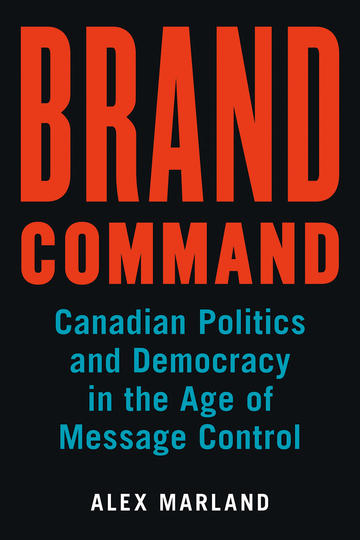Before entering academia, I worked in communications consulting and in government. In the private sector, we had lots of time to ruminate about marketing strategy. But in government, the best laid plans were often dispatched in the rush to deal with the tyranny of the urgent. Why? In the public sector, the intensity of media attention is unrelenting. Communicators lunge from issue to issue. It is a world of nonstop 24/7 media, smartphones, social media outbursts and impossible expectations.
My research in Brand Command: Canadian Politics and Democracy in the Age of Message Control argues that message control and party discipline is important to anyone who rises to the top. I draw on information from over 70 interviews with Ottawa insiders, files obtained through access to information, and a review of internal political party documents to argue that marketing is pervading both politics and public administration. Strategists relay that relentless repetition of approved lines is necessary to push forward an agenda. Pairing the written and spoken word with matching visuals and backdrops is even better. Symmetry and consistency is how they counteract a barrage of competing stimuli and the media’s drive for infotainment. This is good because it simplifies things for citizens leading busy lives. But it also centralizes power.
In his influential book Governing from the Centre: The Concentration of Power in Canadian Politics (University of Toronto Press, 1999), Donald Savoie persuasively argued that power clusters among members of the Prime Minister’s Office and key ministers, as well as senior civil servants in central agencies like the Privy Council Office and the Treasury Board Secretariat. The sponsorship scandal that led to the Commission of Inquiry into the Sponsorship Program and Advertising Activities (the Gomery Inquiry) also revealed how interwoven the apex of government is, and how partisan interests come first. Since then, dramatic innovations in communications technology have decentralized the structures of many organizations. Yet in government we have seen further concentration of power in the centre.
Parliament is supposed to act as a check on the political executive; instead, parliamentarians act as communications conduits – whom I dub “brand ambassadors.” The same is true for candidates who stand for election. Notice how ruthlessly political parties end the ambitions of candidates who say something that damages the brand – even a stupid remark on social media before they entered politics? Ever thought about what kinds of representatives we end up electing? They might be more honourable than in the past, but when was the last time an elected official publicly stood up for constituents by critiquing a policy promoted by her or his own party leader? What happens if they do? What does this mean for the concentration of power?
Canadian politicians, political staff and civil servants increasingly see approved messages as a tool for survival. There is career safety in sticking to a coordinated script and spinning information. This is a function of defending the brand. Brand Command argues that message control has significant implications for Canadian parliamentary democracy.
Alex Marland is a leading researcher about Canadian political marketing and is a co-editor of the UBC Press series Communication, Strategy and Politics. He is Associate Professor of Political Science and an Associate Dean at Memorial University of Newfoundland.
Bookmark It!
As the voice of the humanities and social sciences in Canada, the Federation is a great supporter of books. Our Awards to Scholarly Publications Program (ASPP) has supported the publication of important Canadian scholarly books since 1941. Bookmark it! shares the story behind some of these fascinating books. Occasionally, we’ll also highlight other books that are significant to Canadian culture, society and research. Read more posts.
Livres à vous!
En tant que porte-parole des sciences humaines au Canada, la Fédération est une fervente défenseuse des livres. Notre Prix d’auteurs pour l’édition savante (PAES) soutient la publication d’importants livres savants canadiens depuis 1941. Livres à vous! dévoile les coulisses de ces livres fascinants. De temps en temps nous mettrons en avant d’autres livres qui jouent un rôle important pour la culture, la société et la recherche canadiennes. Lire d’autres billets.

